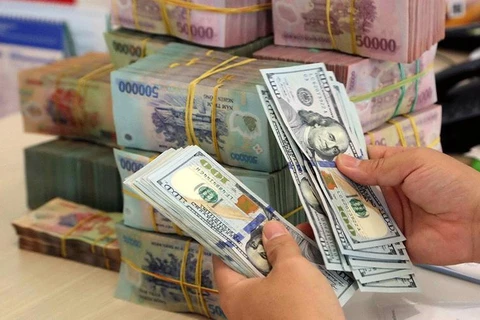 While savings interest rates have dropped, allowing for reduced lending rates, credit growth has been slow due to challenging global and domestic macroeconomic conditions. (Photo: VNA)
While savings interest rates have dropped, allowing for reduced lending rates, credit growth has been slow due to challenging global and domestic macroeconomic conditions. (Photo: VNA) The domestic stock market in Vietnam, comprising the Ho Chi Minh Stock Exchange (HoSE), the Hanoi Stock Exchange (HNX), and the Unlisted Public Companies Market (UPCoM), has shown improvement in transaction value since the beginning of the second quarter. The average session value has risen from 476 million USD in the first quarter to 677 million USD in the second quarter and further to 1.01 billion USD in the third quarter of 2023.
This growth can be attributed to the decrease in deposit interest rates and a more favourable macroeconomic context, encouraging investors to seek higher-risk and higher-profit investment opportunities in the stock market.
Although interest rates have reached historically low levels, even lower than during the COVID-19 pandemic when the State Bank implemented monetary policy measures to support businesses and individuals, the stock market has not witnessed trading sessions with values exceeding 2 billion USD as it did during the pandemic.
Tran Minh Hoang, head of Analysis at Vietcombank Securities Company (VCBS), explains that the current context differs from the previous period, making it unlikely for a significant capital shift towards securities.
Hoang suggests that the Government and the State Bank are currently directing capital towards production and business activities while limiting speculative investments to prevent asset bubbles. Although credit growth for the entire economy reached 7.4% by the end of October 2023, significantly lower than the 11.6% increase during the same period in 2022 and far from the 14% credit growth target for 2023, banks still have excess liquidity. Hoang believes that low interest rates need to be maintained for a longer period to observe a substantial capital flow shift to the stock market.
Le Pham Duy Nhan, head of the Portfolio Management Department at Vietcombank Fund Management Company (VCBF), anticipates credit growth for the banking system to reach 11-12% in line with GDP growth projections of over 5%. While savings interest rates have dropped, allowing for reduced lending rates, credit growth has been slow due to challenging global and domestic macroeconomic conditions. Banks need to exercise caution in lending to minimise the risks of bad debt, which has recently increased significantly.
Nhan emphasises that for industry-wide credit growth to accelerate, it will take time for government support policies to penetrate the economy. Positive signals from major export markets are also necessary for Vietnam, given its highly open economy.
Observing the current market, investor Nguyen Xuan Bach notes attractive price ranges for many stocks, particularly in industries benefiting from expansion and real estate businesses with an advantage in land resources. However, cash flows into the market are not yet substantial, mainly consisting of short-term and alternating movements. Bach advises investors to be cautious, analyse industry trends, and carefully select available stocks. Patience is crucial in finding the best buying points and avoiding hasty investments.
Le Pham Duy Nhan reveals that VCBF is maintaining a high proportion of stocks in long-term favoured industries such as information technology, industrial parks, logistics, and utilities due to their potential for stable profit growth. The retail and consumer sectors also present attractive opportunities due to their lower valuations resulting from weak domestic demand and declining profits.
Nevertheless, Nhan emphasises the importance of asset preservation, especially since the market has recently experienced a recovery. Short or long-term trading strategies should be based on individual preferences and stock types, but investors should allocate capital appropriately for their investments./.
VNA
























